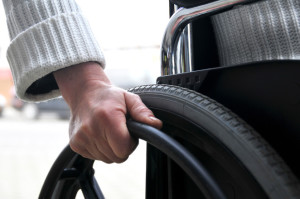This article is also available in: 日本語
Four months have passed since I moved to Syracuse, New York.
The best part of the experience living here is meeting wonderful people who inspire me.

Professor Arlene Kanter is one of them.
She founded the law school’s Disability Law and Policy Program and she teaches law students and graduate students from all over the university in her courses on disability rights law, international human rights law.
In my blog, many times I mentioned the ADA (Americans with Disabilities Act)which changed the lives of people with disabilities in the US.
In addition to the ADA, the US has many other laws that protect the rights of people with disabilities in education, employment, communication, housing, and accessibility etc.
Generally in American culture, one of the common ways people with disabilities enforce their rights is to hire a lawyer, and go to court.
However, lawsuits can take a long time to resolve.
As Professor Kanter recalls:
“I remember that one of the early cases I had involved a young man with a disability who had been denied educational services in school.
When I met him, he was about 20 years old.
But the case had been gone since he was about 14.
Such cases take too long and courts are not the place to resolve the educational needs of the student.
But sometimes there is no choice if schools refuse to provide the services to which the student is entitled. ”
Professor Kanter no longer represents individual clients, but she now works with governments and civil society organizations in many countries to help them develop and enforce disability rights and education laws.

She shared an example in Israel, which has a different system than in the US regarding how to ensure accessibility of buildings.
In the US, a person has to sue to make a building accessible.
But in Israel, the government has created a new certification for professionals who are trained to assess accessibility of buildings.
Before a building may open one of these certified professionals have to go and assess the building to see if it complies with Israel’s accessibility law.
If it does, the professionals will recommend that the building can open; if not, the building owner has to fix the accessibility problems before it can open.
In the US, new and renovated buildings (except private homes) have to comply with the ADA Accessibility Standards.
But unlike in Israel, there is no person who has to certify that the building meets accessibility standards before it can open.
So after a building opens, if a person finds that it does not comply with the ADA standards, the person has to sue in court.
That means that buildings may remain inaccessible unless and until someone decides to sue, or until the owner decides to fix the problems voluntarily to avoid a future lawsuit.
Either way, ensuring accessibility may take time and additional costs to make a building accessible, especially after it has already been built.
Professor Kanter reminds us that
“Laws are only words on paper; they don’t mean anything unless and until they are implemented.”

In the area of employment, too, it is illegal to discriminate against people with disabilities in the US, but such discrimination continues.
The rate of unemployment for people with disabilities is nearly double the rate for people without disabilities in the US.
And like the situation with buildings, if a person with a disability believes that he or she has been denied a job because of disability, the person has to go to court and prove discrimination under the ADA.

In Japanese society, going to a court to sue is not as common as in the U.S.
There is a huge gap between what laws regulate and what reality is.
In terms of employment for people with disabilities, the latest statistics updated in November 2015 by The Ministry of Health, Labour and Welfare of Japan shows that only 47.2% of targeted companies have met the quota*.
The quota is mandated by a law, but why more than half of companies chose to pay penalty instead of hiring people with disabilities?
Importantly, we can never solve an issue of unemployment for people with disabilities just by requiring the payment of a penalty.
If people with disabilities don’t have a place to work, they would just stay at home and receive social welfare from the government.
By doing so, some parents also would need to stay at home to take care of them.
In addition, we should notice the importance of manpower of people with disabilities, especially because Japan is losing young population today.
If we think of the country’s total productivity and expense, hiring people with disabilities is a much better choice.
Laws are made to make a better society.
We have to take them seriously, and enforce them, even if that takes hard work.
Reference:
*1. I have mentioned about the quota system Japan government adopted here at:
https://moonrider7.com/2016/02/07/independent-living2/
See Arlene S. Kanter, The Americans with Disabilities Act at 25 Years: Lessons to Learn from the Convention on the Rights of People with Disabilities, 63 Drake L.R. 819 (2015). The May 2015 figures from the U.S. Department of Labor’s monthly employment report indicate that the unemployment rate for this population remained largely unchanged at 10.1 percent as opposed to the general unemployment rate of 5.5 percent. See also Shaun Heasley, Disability Employment on the Rise, DISABILITYSCOOP (June 5, 2015), http://www.disabilityscoop.com/2015/06/05/jobs-may-15/20358/
